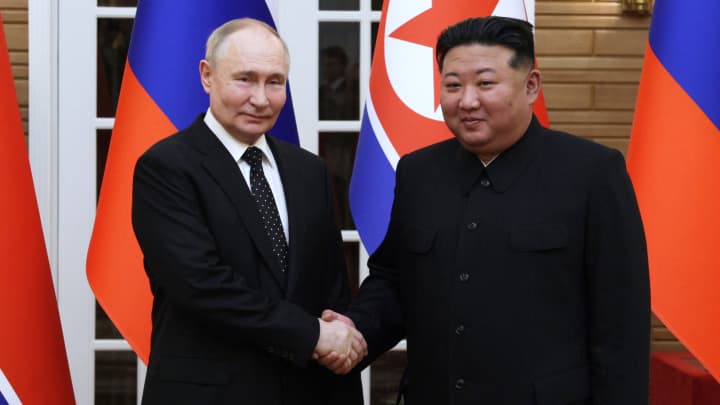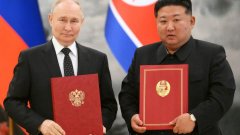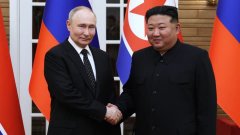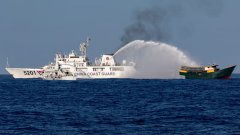
Even a long wait for Russian President Vladimir Putin's arrival in Pyongyang in the early hours of Wednesday morning was not enough to dampen Kim Jong Un's enthusiasm for his "comrade."
Waiting on the runway as Putin disembarked his plane shortly before 3a.m. local time, , North Korea's leader Kim Jong Un beamed as he greeted his Russian counterpart with a shake of hands and an embrace. State-controlled North Korean news agency KCNA said Kim "could not contain his joy" at what it described as a "touching reunion."
As a large motorcade accompanied the leaders into the capital, whose streets had been draped with Russian flags and portraits of Putin, Kim praised the "historic" occasion — Putin's first visit to North Korea in 24 years and a now-rarer trip abroad for the president — and the "invincibility and solidity" of the Russia-North Korean relationship.
After a lavish welcoming ceremony on Wednesday morning, which saw tens of thousands of North Koreans line the streets, cheering and singing in honor of Putin's visit, the Russian leader thanked North Korea for its "consistent and unwavering support for Russian policy, including in the Ukrainian direction."
Putin also signalled that the states could sign a "comprehensive strategic partnership" during the trip, signalling that this isn't just a friendly state visit to cement diplomatic relations, but one to expand mutually-beneficial strategic transactions — the quid pro quo — between the countries.
On the face of it, North Korea appears to be the supplicant in its relationship with Russia, but Pyongyang holds a trump card when it comes to Moscow, for now at least: it can provide Moscow with millions of artillery rounds and short-range ballistic missiles for use against Ukraine.
Western officials accuse North Korea of circumventing international sanctions to transfer munitions and missiles to Russia, although Pyongyang has denied any such arms handover has taken place. In return, Russia is likely providing North Korea with food, fuel and military technology for its satellites and submarines, analysts say.
"North Korea has certainly seen a wonderful opportunity for itself in Russia's isolation from the world," Rodger Baker, executive director at Stratfor Centre for Applied Geopolitics, told CNBC on Wednesday.
"North Korea has long been heavily, heavily dependent on China and even if Russia can pick up 5-10% of North Korean trade that's a big benefit for the North Koreans. The Russians are [also] talking about ways for both countries to bypass Western sanctions and financial restrictions so that potentially gives North Korea to new flows of economic activity, not only with Russia but potentially internationally," he said.
For Kim, the quid-pro-quo priority will be requests for new advanced military technology transfers, according to the Teneo consultancy's Vice President James Brady and Senior Advisor Victor Cha.
"It is unclear how much Putin will be willing to give, but Kim's wishlist includes technologies related to advanced telemetry, nuclear-powered submarines, military satellites, and intercontinental ballistic missiles. Russian technology likely contributed to Pyongyang's first successful military spy satellite launch in November 2023 — just two months after the last Putin-Kim summit," they said in a note on Tuesday.
Kim may also try to use a "high watermark" in ties to seek a new bilateral security partnership agreement similar to a mutual defense treaty signed by North Korea and the USSR in 1961, which remained effective until around 1990.
It's not surprising that Kim is proud to show his own people and the world that he has a powerful friend in Putin. Isolated on the global geopolitical stage and heavily sanctioned for its nuclear weapons program and missile testing, North Korea is widely seen as a "pariah" and "rogue" state by the West.
While the streets of Pyongyang glistened for Putin's arrival, the bitter reality in North Korea is that abject poverty and food and fuel shortages are commonplace for the majority of the population living under the totalitarian rule of the Kim dynasty.
"In addition to the practical outcomes, the visit also gives a profile boost to Kim, who gets to play the role of statesman to both domestic and international audiences," Brady and Cha said.
While North Korea and Russia might extol the depth and strength of their relationship for now, the fact that Putin hasn't visited the country in the last 24 years speaks volumes.
Since invading Ukraine in 2022, however, Russia's status and priorities have changed. Its isolation from the West has become significant while it has accelerated its pivot toward the East, as it looks for allies and customers for its oil and commodities.
Meanwhile at home, Russia's military-industrial complex has been placed on a war footing although analysts say it still faces a shortfall in what it can produce monthly and on what it's expending on the battlefield in Ukraine.
Putin needs Kim's weapons to make up for a monthly munitions shortfall of 50,000 rounds, even if Russia is producing ammunition at full capacity in the pursuit of victory in Ukraine, the Center for Strategic and International Studies .
As such, North Korea offers Russia another source of military hardware. Although both sides deny arms transfers have taken place, U.S. officials have claimed Pyongyang has supplied Russia .
"The nature of the visit makes it unlikely that all outcomes will be detailed publicly, but the goals of the two sides are clear. For Putin, the key aim is to secure an ongoing supply of arms and munitions to aid Russia's war in Ukraine," Teneo's Brady and Cha said.
"There could be a co-production agreement for several types of ammunition as well as an order for more ballistic missiles. This pressing need for military supplies has transformed the dynamic in the bilateral relationship in the last two years, making Pyongyang a much more valuable partner for Moscow."
Correction: Putin thanked North Korea for its "consistent and unwavering support for Russian policy." An earlier version didn't convey that precise meaning.




